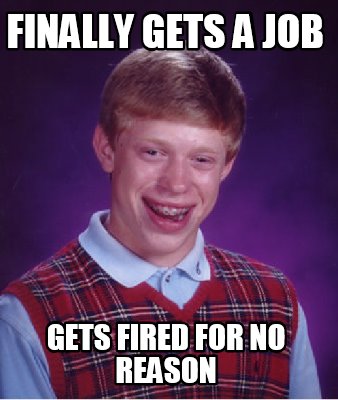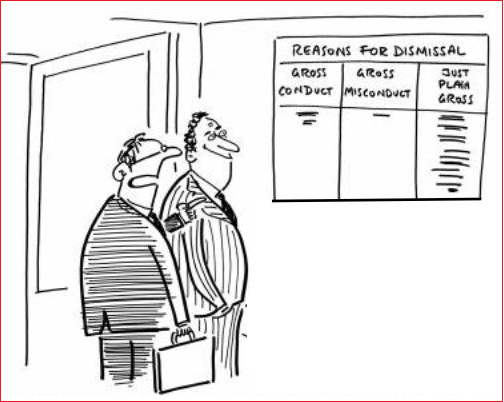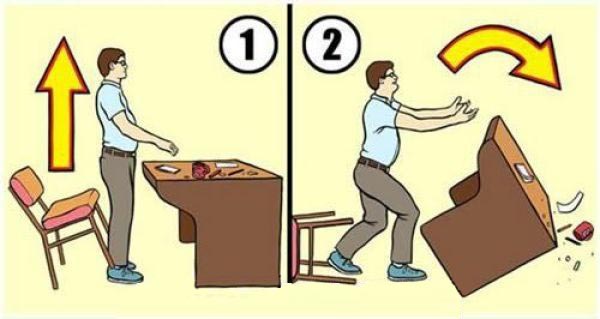

Industrial,Employment
My boss just fired me for no reason, what can I do now?
almost 8 years ago Denise C.Imagine that your boss suddenly walks over to your desk and hands you a letter that only says:
"The Company has decided to terminate your employment. Pursuant to your employment contract, you will be given a one month notice period, taking effect from the date of this letter".
Basically, you've just been fired.
Your boss won't tell you the reason you're being fired, but says you would be receiving a termination package.
Many Malaysians faced with this situation may just assume nothing can be done, accept the termination package, and leave after the notice period.
But the good news is, the Malaysian legal system actually provides relief for cases like these.
Your boss cannot fire you for no reason
Image from cilisos.my
Our mindset about hiring and firing employees may have been exacerbated by television shows that depict characters just leaping over the counter and flamboyantly telling their bosses bye or by bosses just kicking the staff out without notice. However, it is important to note that Malaysia's employment law actually differs from what is known as the principle of "At-will employment". "At-will employment" is kind of like what you see in movies, that either the boss or the employee can walk off without reasons or repercussions.
Instead, Malaysia requires employers to provide the employees with reasons for dismissal. This is called termination with just cause and excuse and essentially provides that if your employer fired you with no reasons or with faulty reasons, then you might be able to bring your case to court. However, as an employee, you do not have to provide a reason if you want to resign.
This is provided for under section 20(3) of the Industrial Relations Act 1967 ("IRA 1967") which states that any workman who feels that he has been dismissed without just cause and excuse (also typically referred to as unfair dismissal), can write in to the Director General of Industrial Relations in order to request for his job back:
Section 20(3) of the Industrial Relations Act (in part):
"Where a workman, irrespective of whether he is a member of a trade union of workmen or otherwise, considers that he has been dismissed without just cause or excuse by his employer, he may make representations in writing to the Director General to be reinstated in his former employment..."
So what does it mean to have "just cause and excuse"? There is no set definition for what amounts to just cause and excuse in the statute because what amounts to a just cause differs from situation to situation. It could range from employee misconduct such as thievery, fighting in the office and continuous tardiness. It could also cover situations which involve retrenchment. The key takeaway point from this is that regardless of whether you had acted in a way that prompted a dismissal or not, your boss MUST give you a reason for firing you.
But what if your boss did not give a reason? Does this mean that you would go to the Industrial Court immediately? Actually, there is one step before that...
First, you would have to try to negotiate a settlement
 The first thing you would have to do is file a complaint with the Director General within sixty days of you getting fired. What would happen is that the Industrial Relations Department would arrange for a meeting between the employer and yourself in order to reach an amicable solution. If a solution is reached, the officer in charge would draw up an agreement recording the terms of the settlement and the matter would be considered resolved.
The first thing you would have to do is file a complaint with the Director General within sixty days of you getting fired. What would happen is that the Industrial Relations Department would arrange for a meeting between the employer and yourself in order to reach an amicable solution. If a solution is reached, the officer in charge would draw up an agreement recording the terms of the settlement and the matter would be considered resolved.
It is important to note that during this conciliation stage, you cannot be represented by a lawyer. You can only represent yourself or if you belong to a trade union, you can be represented by an officer or employee of that trade union.
Section 20(1A) IRA 1967:
"The Director General shall not entertain any representations...unless such representations are filed within sixty days of the dismissal..."
Section 20(6)(b) and section 20(7) IRA 1967:
"a workman may— (i) represent himself; (ii) where he is a member of a trade union of workmen, be represented by any officer or employee of such trade union of workmen...(7)...a workman or employer shall not be represented by an advocate, adviser, consultant or by any other person whatsoever."
If an agreement could not be reached, the matter would then be reported to the Minister of Human Resources, who decides whether or not to refer your case to the Industrial Court. The Minister would typically refer the cases when there are serious issues to be decided and if the claim is valid.
"The Minister of Human Resources...has the discretion to refer the matter to the Industrial Court if he is of the view that the claim discloses serious issues of law or fact to be decided, and/or if he finds that the claim is not frivolous or vexatious." - Donovan Cheah, founding partner of Donovan and Ho in an interview with the Malaysian German Chamber of Commerce and Industry.
Hence, if the Minister thinks that you have a legitimate claim, he would forward your claim to the Industrial Court.
When negotiations fail, that's when you end up in the Industrial Court
Image from citizenjusticenetwork.org
An Industrial Court proceeding is actually handled, more or less, like a civil court case. This means that you would be able to get legal representation, produce bundles of evidence and use witnesses.
The case would usually be heard by one chairman sitting alone and generally, proceedings would not be as strict as those in the civil courts because following section 30(5) IRA 1967, the Industrial Court is supposed place more importance on fairness rather than proper legal procedures:
"The Court shall act according to equity, good conscience and the substantial merits of the case without regard to technicalities and legal form."
AskLegal spoke to Amirul Izzat, a lawyer specialising in employment law who told us that:
"The basic rules of evidence still apply in an Industrial Court trial but it would be given a more relaxed approach as this court is a court of equity that is empowered by the statute to determine matters based on its substantial merits. For example, strict technicalities relating to inadmissibility of hearsay evidence may not be applied rigidly. However, this is still dependent on a case by case basis." - Amirul Izzat, employment lawyer with Donovan and Ho, in an interview with AskLegal.
Aside from conducting the proceedings in an fair manner, the chairman can also decide on the proper compensation that you will receive. This means that even though section 20(3) that is quoted in the previous point mentions that you can apply to be reinstated to your job, the Industrial Court can actually give you another award instead, such as asking your employer to pay you damages.
Take for example the case of Justin Maurice Read v Petroliam Nasional Berhad (Petronas) where the court decided that the relationship between the employer and employee was bad beyond repair, so reinstating the employee to his former position was unworkable. The court then proceeded to award the employee which damages which was his back wages counted from the date of his dismissal to the date of the court hearing.
What if I was not fired but forced to resign?
Image from employment-lawyers.ca
If your boss did not fire you but created a work environment that made it difficult for you to work in which led to you resigning, you may have a case for constructive dismissal. Constructive dismissal is when your boss does not outright fire you but because of how he acts, it might actually be an unfair dismissal.
There are many situations that can lead to a constructive dismissal but an example of a scenario is:
Your colleagues have been taunting and ostracizing you in the office. This situation makes you uncomfortable and unhappy so you approach your boss in hopes of a resolution of the conflict or to transfer you to a different department. However, your boss tells you that he will investigate the matter but nothing happens. Unable to bear with the situation in the office, you resign.
If you try to bring a case of constructive dismissal, you have to prove several factors. In the UK case of Western Excavation (ECC) Ltd v Sharp, the judge decided that you must prove that a root (core) part of your contract was breached, so your decision to leave the company was due to this breach than for any other reasons.
For example, if you claim that you had to leave the company because your boss failed to provide you with a personal stapler and you had to borrow one from your neighbour, your case might not even reach the Industrial Court as having a personal stapler may not be seen as a root part of your contract.
However, if you left because you felt unsafe in your working environment, that reason may actually be one that goes to the root of your employment contract. In other words, failing to provide a safe working environment is a serious breach of your contract. For context, in the Justin Maurice case mentioned above, the employee had actually been assaulted by a manager and his work locker was broken into. Due to failures of the company to carry out proper investigations, the court found that a fundamental term of the contract had been breached due to the failure to provide a safe working environment.
At the end of the day, if you are facing difficulties at your workplace or have been laid off without reason, it might be wise to remember that proper documentation would help if you want to file an unfair dismissal claim and bear in mind that you only have sixty days to file a claim.
"No no I clean"



